For those of us who live in China’s large cities, the stunning pace of technological and economic development can be overwhelming: ubiquitous smartphones, buses full of people streaming video on their hand-held devices as they commute in air-conditioned comfort, door-to-door food and grocery deliveries, super-chic cafes selling sugared caffeine or fruit libations hot or cold, Uber and DiDi rides on demand, and of course the explosion of online shopping. This is the “new China,” a thoroughly modern place that seems nicely in step with the cultural and economic trends we are familiar with back home in our passport countries.
Just this past week, China’s major consumer holiday “Singles Day” set new records for consumption, with the giant online company Alibaba racking up one billion dollars in sales in the first eight minutes of the day. Known in Chinese as double-eleven day (双十一节) or “bare branch” day (光棍节), Singles Day is celebrated every year on November 11. The loneliness of all those single digits in a row (11/11) provides an excuse for the unmarried to indulge in a day of self-centered purchasing. Symptomatic of its identification with new China, the holiday is then shared through WeChat posts devoted to screen captures of overstuffed online shopping carts and accompanying reflections on owner’s pride and buyer’s remorse. An evening out with friends spent eating, partying, and showing off one’s purchases brings this thoroughly “now” holiday to a close.
This year some unresolved confusion between my computer, my bank, and AliPay kept me from taking advantage of all the online bargains. As I went through what thus became a fairly normal workday, I had a series of encounters that were at odds with the themes of new China, yanking me back into the still very much alive world of “old China.”
Early on 11/11, I left my home to run a few errands and immediately noticed the hawkers who had spread out their piles of colorful paper on seemingly every street corner. I could tell that some kind of ghost day (鬼节) was approaching, and I soon discovered that for 2015 the Georgian calendar November 11 corresponded with September 30 on the lunar calendar—the night before October 1.
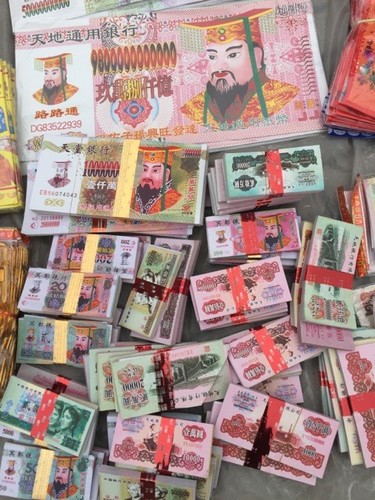
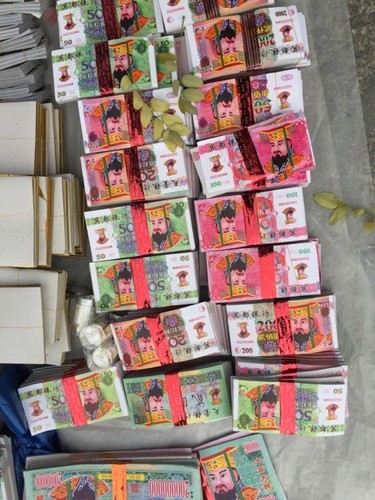
The first day of the tenth month on the lunar calendar is songhanyijie (送寒衣节), one of the three major traditional ghost days (the other two are qingmingjie 清明节in the spring and zhongyuanjie 中元节in the fall). Songhanyijie is the day when families are expected to “send winter clothes” to their ancestors. The origin of the “holiday” comes from the story (孟姜女哭长城) of a woman whose husband had been conscripted by the first Qin Dynasty emperor to help build the Great Wall. She sent her husband some warm clothes for the winter, only to discover that he had already died and was buried in the wall. She travelled in tears to the wall where she uncovered his body, wrapped him in the warm clothes, and buried him again, her filial grief earning the great respect of the emperor.
Chinese popular religion is rooted in the theory of religious correspondence, and so honorable or efficacious actions from the past are imitated in the present. Within the resulting set of religious beliefs and practices, the connections between this world and the next are drawn in what westerners might construe as overly literalistic ways. In this instance, the dead are believed to have similar needs to the living, and so items they might require are “sent” to them in the afterlife by burning paper approximations, the smoke and ashes conveying the material items into the spiritual realm.
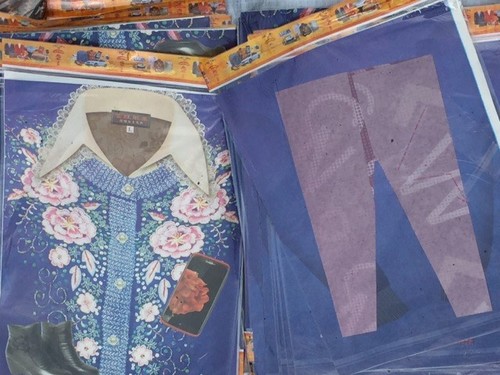
Looking at the paper (and fabric!) clothes that were for sale, I noticed that some of the outfits had size labels in them. There were plenty of “L” and “M” clothes, but for some reason no “S.” I also noticed that alongside the clothes and requisite paper money (bribes are necessary in the bureaucracy of Chinese hell) there were paper food items for sale, including watermelon—though I could not imagine anyone sending their ancestors cold fruit to eat in winter (in Chinese traditional medicine cool, wet foods like watermelon should be eaten in summer, yet another example of correspondence). As far as I could tell, no one was really buying anything. The whole thing seemed like a very marginal and outdated activity that didn’t really have much to do with people’s lives today.
On my way home for dinner I stopped to purchase some fruit from a stall next to a middle class housing development. It was already dark, and the ground beside the fruit seller happened to be covered with a display of sacrificial paper goods for sale. As I knelt to pick out some apples, a well-dressed woman came up behind me and asked in a hurry, “how much for the clothes?” Once I stood up and she saw my face, she quickly brushed past and asked the fruit sellers (for they had diversified into sacrificial wares). “Two kuai for the paper clothes, five kuai for the fabric ones.” The woman grumbled and raced off to the next corner, apparently looking for a better deal. I was struck, however, by two things: this whole process was causing her great anxiety, and she was definitely buying some clothes to burn.
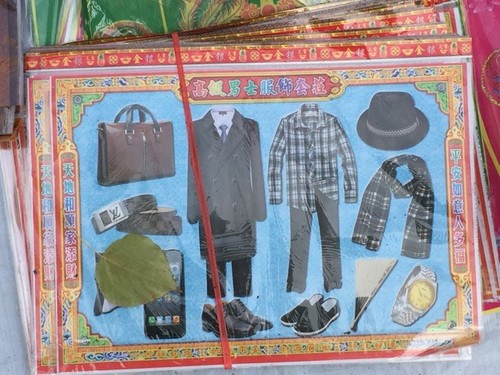
Still later that same evening I was in a taxi travelling across town. I started my ride in the center of town, where young and apparently single people were gathered in the restaurants, retail shops, and karaoke clubs spending money and enjoying the supposed perks of “bare branch” singleness. My driver was young, but he was already married with a child, and he had little interest in online shopping or conspicuous consumption.
A recent arrival from a rural village several hours north of our city, he was unhappy with his job driving a taxi. Prior to the economic downturn, he had earned vast amounts of money driving coal trucks across the country. All expenses covered plus a 200 kuai daily pay whether he worked or not was a lot more than he could ever hope to earn driving a taxi in the city.
We talked very frankly about the dangers of long-haul trucking in China, and he was fully aware of the risks. He always avoided expressways because even though they were faster, “if you’re in an accident on the expressway, there is an 80% chance you’ll die.” He tried to purchase his own truck to increase his profits, but his extended family refused to loan him the necessary capital because it was too dangerous. I asked him if he would keep driving taxis, and he quickly replied that as soon as the economy recovered he was going back home to his family in the village and the big money he used to make hauling coal.
I could see the twinkle in his eye as he told me of the six-month period a few years back when he took home 14,000 kuai each month. None of my comments about life insurance or the very real possibility of dying and leaving his wife and child with no source of income could possibly compete with the distant promise of all that wealth. In a flash I realized I was riding across town with an incarnation of the oldest form of economic decision-making, a phenomenon that to me is powerfully representative of what modernization has meant for vast swaths of China’s population. This was the cost-benefit analysis of those who feel they have no real choices and therefore are willing to risk everything for the remotest chance. This was very close to the heart of old China, a world of scarcity, cruel inequalities, and brutish competition.
Throughout our 25-minute conversation, I periodically glanced out the taxi window at the darkened streets of our city. Time and time again I saw lone individuals bundled against the cold crouching over small piles of burning paper. These seemed to me the true “Singles” of the day, as they carefully prodded the ashes ensuring that no piece of paper remained unburned.
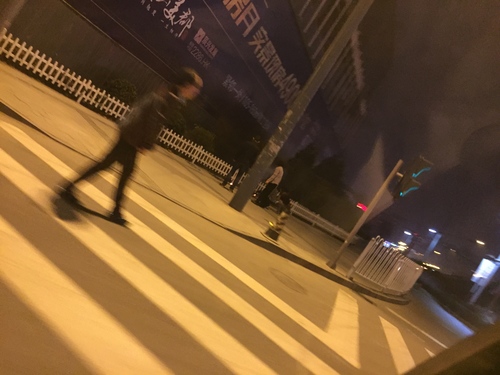
What were their reasons for carrying out these sacrifices for their ancestors (祭祖)? I saw their actions as driven by a desire to be connected—either to stay connected with family members who have passed away, or perhaps to reinforce their own sense of belonging in a social or familial hierarchy where this kind of filial (孝敬) behavior may still carry some weight. Regardless, these rituals were far removed from the internet, involving no display of consumer wealth.
As Singles Day demonstrates, the new China is definitely here, and it is a world that is increasingly familiar to many of us who have come from the outside. And yet I haven’t seen any piles of ashes on my WeChat feed, nor is there much chatter about the economic and social forces that compel so many young, rural men to risk their lives driving poorly maintained trucks over dangerous mountain roads. On a day that trumpets the supremacy of new China—when iPhones and iPads are purchased in staggering numbers from other iPhones and iPads—I kept crashing into the old China and the ways in which it continues to exert its influence over people’s lives. Let’s not be fooled by the familiarity of the flashing neon and growing conveniences we see on the surface: old China remains, distinct and different. In order for our witness to remain cogent and meaningful we must be careful not to lose sight of these less apparent aspects of life in China that continue to function as controlling narratives for many Chinese citizens.
Header image credit: Ad for Bachelor's Day (AKA Singles Day) by John Pasden via Flickr.
Text images credit: Swell in the Middle Kingdom.
Swells in the Middle Kingdom
"Swells in the Middle Kingdom" began his life in China as a student back in 1990 and still, to this day, is fascinated by the challenges and blessings of living and working in China.View Full Bio
Are you enjoying a cup of good coffee or fragrant tea while reading the latest ChinaSource post? Consider donating the cost of that “cuppa” to support our content so we can continue to serve you with the latest on Christianity in China.